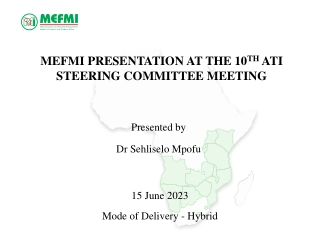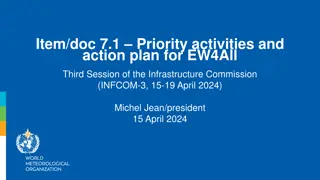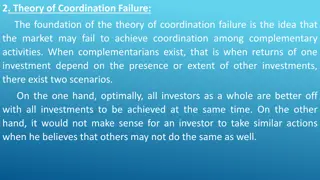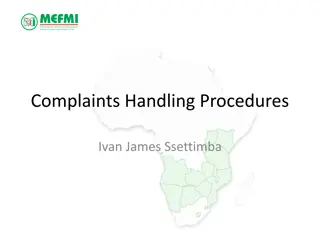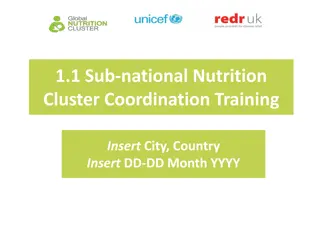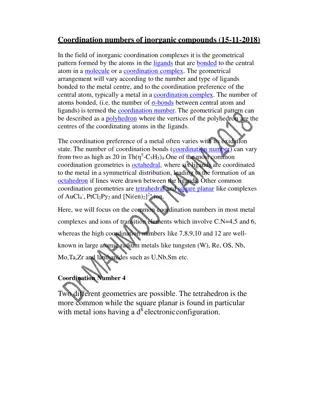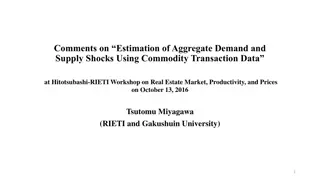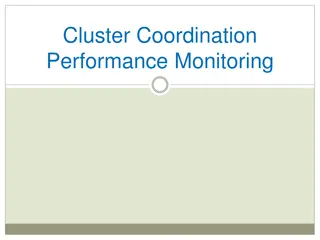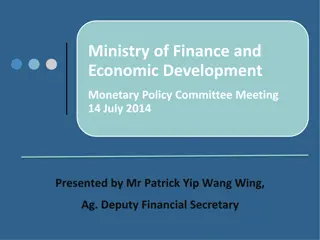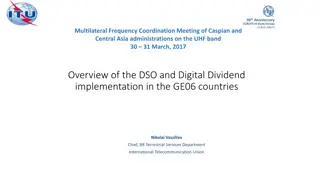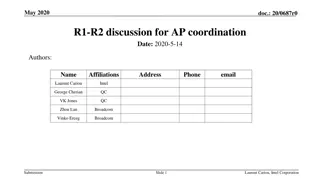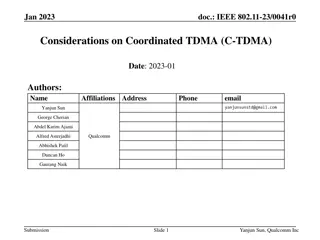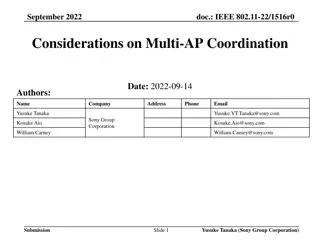MEFMI Presentation on Collaboration and Capacity Development with ATI and IMF
The Macroeconomic and Financial Management Institute of Eastern and Southern Africa (MEFMI) presented on their collaboration with the African Training Institute (ATI) and the International Monetary Fund (IMF) at the 10th ATI Steering Committee meeting. The collaboration includes joint regional cours
1 views • 7 slides
CHILD PROTECTION COORDINATION IN MIXED SETTINGS SHARING GOOD PRACTICES
Explore the effective coordination mechanisms and best practices for child protection in mixed settings involving refugees, internally displaced populations, and other affected groups. Topics include similarities, differences, system strengthening, rights-based approaches, coordination responsibilit
2 views • 25 slides
Analysis of Contemporary Macroeconomic Issues in Papua New Guinea
Professor Stephen Howes, Director of Development Policy at Australian National University, presents his personal views on macroeconomic issues in Papua New Guinea. The focus is on the exchange rate regime and its management, excess liquidity, and fiscal policy. Various economic indicators point to c
1 views • 48 slides
Introduction to Co-ordination Chemistry: Fundamentals and Applications
Explore the fascinating field of coordination chemistry, delving into the complexity of compounds and the coordination bonds that govern their structures. Discover the history, key concepts, and applications of coordination chemistry through a detailed examination of coordination compounds, bonding
13 views • 73 slides
Enhancing R-TWT with Multi-AP Coordination in IEEE 802.11 Networks
Delve into the world of IEEE 802.11 wireless networks as this document explores solutions for multi-AP coordination for R-TWT, focusing on improving tail latency, jitter, and medium protection. Enhancements in R-TWT operation, coordination scenarios, and solutions for multi-AP deployments are discus
1 views • 12 slides
Priority Activities and Action Plan for EW4All Infrastructure Commission: INFCOM-3 Session
The document outlines the priority activities and action plan for the Third Session of the Infrastructure Commission (INFCOM-3) within the Early Warnings for All initiative. It includes background decisions, a draft list of priority activities, and an action plan for contributions to the initiative.
5 views • 10 slides
COORDINATION PATTERNS
Coordination patterns play a crucial role in designing concurrent code, ensuring smooth operation and efficient performance. They help in managing interactions between threads or processes, preventing malfunctions and performance drops. Examples like producer-consumer pattern and bounded buffers ill
1 views • 69 slides
Understanding the Theory of Coordination Failure in Markets
The theory of coordination failure explores how markets may struggle to achieve coordination among complementary activities, leading to suboptimal outcomes. It highlights scenarios where investors' actions depend on each other, emphasizing the role of government intervention to solve coordination is
2 views • 14 slides
Localisation in Child Protection Coordination: A Conceptual Framework
This presentation explores the preliminary conceptual framework and approach for localisation in child protection coordination. It delves into the roles of local actors, coordination systems, governance, decision-making, partnerships, and funding in promoting localisation efforts. The importance of
0 views • 22 slides
Understanding Coordination Compounds and Ligands in Chemistry
Coordination compounds involve ligands that donate electron pairs to central metal ions. Ligands can be categorized based on the number of donor atoms they contain, such as mono-, bi-, tri-, tetra-, penta-, and hexadentate ligands. Each type of ligand has the ability to form bonds with the central m
2 views • 15 slides
Complaints Handling Procedures at Macroeconomic and Financial Management Institute
Effective complaints handling is essential for feedback and improvement in financial services. Learn about the benefits, principles, and responsibilities involved in managing complaints at the Macroeconomic and Financial Management Institute of Eastern and Southern Africa.
0 views • 21 slides
Sub-national Nutrition Cluster Coordination Training Workshop
Welcome to the Sub-national Nutrition Cluster Coordination Training Workshop aimed at sharing key concepts, tools, and approaches for effective coordination of nutrition in emergencies. This training prepares participants for working in Nutrition Cluster/Sector Coordination, promoting dialogue and s
1 views • 10 slides
Enhancing Care Coordination Through Agreements
Effective care coordination is crucial for ensuring quality referrals and improving patient outcomes. Develop a Care Coordination Agreement to streamline the referral process, reduce waste, and enhance cost-effectiveness in healthcare delivery. This agreement serves as a roadmap for standardizing co
0 views • 49 slides
Coordination Numbers in Inorganic Compounds: Geometries and Structures
In inorganic coordination complexes, the coordination number refers to the number of atoms bonded to the central atom. Common geometries include octahedral, tetrahedral, and square planar, depending on the type and number of ligands. Transition metal complexes exhibit different coordination numbers
2 views • 8 slides
Understanding Coordination Chemistry: Structures, Isomers, and Naming
Exploring coordination chemistry involves understanding structures, isomers, naming conventions, and common coordination numbers, all essential in studying coordination compounds. Coordination compounds consist of central metals, ligands, and charge balancing ions. Naming involves listing cations, l
0 views • 46 slides
The Future of the European Semester: Economic Policy Coordination in the EU
The European Semester is a framework for coordinating economic policies in the EU, focusing on fiscal sustainability, macroeconomic imbalances, structural reforms, and investments. The cycle involves key steps at both the EU and national levels, with pros and cons identified in its implementation. T
0 views • 7 slides
Estimation of Aggregate Demand and Supply Shocks Using Commodity Transaction Data
This study presented at Hitotsubashi-RIETI Workshop analyzes demand and supply shocks using commodity transaction data. By estimating elasticity parameters and examining movements in price and quantity, the research identifies negative supply shocks post-global financial crisis and after 2013. The p
0 views • 8 slides
Understanding the IS-LM Model for Macroeconomic Analysis
The IS-LM model, discussed in Chapter 12 of Macroeconomics, helps analyze how an economy responds to policy changes and shocks in the short run. By understanding the IS and LM curves and their intersection, we can evaluate short-run macroeconomic outcomes for real interest rates (r) and real output
0 views • 103 slides
Understanding Policy Pro-cyclicality in Macroeconomic Theory
Delve into the concept of policy pro-cyclicality in macroeconomic theory through the insights shared by Jeffrey Frankel at a seminar at Harvard Economics Department. Explore examples of pro-cyclicality in developing countries, euro periphery countries, and US political scenarios, along with discussi
0 views • 42 slides
Gender Inequality and Macroeconomic Policy
Exploring the differential impacts of macroeconomic structures and policies on gender equality, this analysis delves into issues such as gender-biased access to resources, labor-intensive export orientation, and the effects of inflation targeting. It highlights how women, especially in marginalized
0 views • 14 slides
Macroeconomic Policy for Development and Decent Work in South Africa
This research agenda delves into the core conclusions, policy context, and objectives of macroeconomic policy for facilitating development and decent work in South Africa. Key points include the need for structural transformation, challenges in job creation, and the link between macroeconomics, empl
0 views • 44 slides
Macroeconomic Measurement: GDP, Unemployment, and Labor Force Analysis
This content explores various aspects of macroeconomic measurement, including GDP calculation, real vs. nominal GDP, GDP deflator vs. CPI, and unemployment rates for different groups. It provides tables and figures to illustrate these concepts and data sources from reputable organizations like the U
0 views • 13 slides
Understanding Cluster Coordination Performance Monitoring (CCPM)
The Cluster Coordination Performance Monitoring (CCPM) is a self-assessment tool that helps evaluate cluster performance against core functions and Accountability to Affected Populations. It aims to improve coordination and accountability within clusters, developed by the IASC Sub-Working Group. Mon
0 views • 16 slides
Macroeconomic Policy in the Eurozone: Challenges and Alternatives
The macroeconomic policies in the Eurozone led by the Troika (ECB, European Commission, IMF) have been criticized for contributing to slow growth and high unemployment. This analysis by Mark Weisbrot delves into the negative impact of fiscal, monetary, and exchange rate policies on troubled economie
0 views • 32 slides
Understanding Coordination Complexes and Transition Metals
Today's lecture covers transition elements, coordination complexes, ligand types, geometries, naming, isomers, and bonding in coordination complexes. Transition metals form coordination complexes with metal ions, ligands, and counter ions. The types of ligands include monodentate and bidentate ligan
0 views • 24 slides
Update on Ministry of Finance and Economic Development Monetary Policy Committee Meeting
The Ministry of Finance and Economic Development Monetary Policy Committee Meeting held on July 14, 2014, highlighted key policy announcements including public sector reforms, business facilitation improvements, and coordination of macroeconomic policies. The focus on transitioning to a High Income
0 views • 18 slides
Overview of Multilateral Frequency Coordination Meeting for Digital Dividend Implementation
The Multilateral Frequency Coordination Meeting discussed progress in implementing digital switchover and digital dividend in the GE06 countries. It highlighted the allocation of spectrum for mobile services and the importance of coordinated implementation. Various coordination groups in Region 1 wo
0 views • 14 slides
Enhancing Risk Assessment for Sovereign Bond Spreads with Macroeconomic News Sentiment
Eurostars project SENRISK aims to develop an automated credit risk assessment tool for fixed income products by incorporating news sentiments. This innovative Decision Support System enhances predictive risk models using sentiments from macroeconomic news and social media. The project focuses on val
0 views • 24 slides
The Return of International Policy Coordination: Challenges and Opportunities
Calls for international macroeconomic policy coordination are resurfacing after a 30-year hiatus, with discussions on the evolution of coordination, reasons for its decline, and the revived interest in G-20 summits. Scholars and policymakers are exploring various frameworks for coordinating fiscal a
0 views • 30 slides
Enhancing Healthcare Emergency Preparedness and Response in Wisconsin
The Wisconsin Hospital Emergency Preparedness Program (WHEPP) focuses on supporting hospitals in planning and responding to mass casualty incidents and pandemics. It emphasizes the importance of healthcare coalitions, tier coordination, and disaster medical coordination centers. The program, funded
0 views • 30 slides
Proposal for Release 1/R2 Feature Split in Wireless AP Coordination
The proposal suggests modifying the split between Release 1 and Release 2 features for wireless AP coordination in order to address the lack of consensus on the low complexity AP coordination feature. It aims to enhance clarity and efficiency in the development process while maintaining the value of
0 views • 7 slides
Neo-Kaleckian Macro Model Overview
This presentation explores the Neo-Kaleckian macroeconomic models, examining their development, key elements, and unique features within the broader context of economic theories. It delves into the first-generation models by Harris and Asimakopulos, focusing on markup pricing, labor costs, profit sh
0 views • 22 slides
Assessing Macroeconomic Resilience in the Euro Area
This study assesses the determinants of macroeconomic resilience in the Euro area, emphasizing the importance of economic resilience to absorb shocks, promote convergence, and achieve short-term gains like lower unemployment and higher income. The framework includes components such as absorption, re
0 views • 18 slides
Enhancing AP Coordination for Improved Wireless Network Performance
This document discusses considerations for Coordinated TDMA (C-TDMA) in IEEE 802.11 networks to address issues of limited coordination among Access Points (APs). The objective is to enhance coordination among APs to improve network reliability in terms of latency, throughput, and fairness. Design pr
0 views • 14 slides
Macroeconomic Modeling of Climate Change in Policy Making
In this seminar by Charl Jooste at the Bank of Uganda, the discussion revolves around the essential ingredients for macro models to incorporate climate policy and climate change. The talk highlights the need to augment standard macroeconomic functions, react to price signals, and link macro models w
0 views • 48 slides
IEEE 802.11-22/1516r0 AP Coordination Considerations
Review of discussions on AP coordination in WNG sessions and EHT SG/TGbe meetings, proposing advancements for future WLAN technology. Emphasis on the importance of prioritizing AP coordination to address various WLAN objectives effectively. Details on AP coordination subtypes and their impact on rel
0 views • 11 slides
Distributed Coordination Algorithms for Robotic Swarms: Challenges and Innovations
Explore the world of robotic swarms through the lens of distributed coordination algorithms. Discover various coordination tasks, synchronization models, and algorithm results, alongside the evolution of robot models for enhanced efficiency. Delve into coordinated movement, flocking behaviors, and t
0 views • 10 slides
Understanding Budgeting and Budget Implementation Process in Government
This presentation delves into the concepts of budgeting and budget implementation in the context of government finance, focusing on fiscal policies, macroeconomic goals, and the budget framework. It explains how budgets reflect government priorities and strategies to achieve economic stability and g
0 views • 26 slides
Enhancing Care Coordination in the Medical Neighborhood
This content emphasizes the importance of ensuring high-value care coordination through effective referral processes and close-loop tracking in the medical neighborhood. It discusses key action steps, such as developing care coordination agreements and providing a high-value referral response. Furth
0 views • 26 slides
Submarine Cable Resiliency Update and Recommendations
Working Group 4A provides updates on the status of submarine cable resiliency, highlighting the risks to infrastructure due to lack of coordination across agencies and clustering of cable routes. The group aims to enhance regulatory coordination and promote geographic diversity to ensure network res
0 views • 7 slides
